Paris climate talks updates: With new draft finished, negotiators regroup in home stretch of summit
- Share via
Gov. Jerry Brown's trip to Paris is coming to a close. He flies home early Thursday morning, capping a day where he held a panel discussion with U.S. Energy Secretary Ernest Moniz, are on Wednesday.
On Monday, Brown touted California's environmental parternships with China, a glimpse of how the state could play a key international role. Meanwhile, the state faces steep challenges in getting more clean vehicles on the road.
Negotiators from around the world have finished a new draft of an international climate accord, and they plan to meet again on Wednesday evening to share feedback. Although the final deadline is Friday, it's possible that talks will spill over into the weekend. Many disagreements still need to be sorted out, and India has pushed for developed countries to shoulder more of the burden for addressing global warming.
Times reporters Chris Megerian and Alexandra Zavis are in Paris covering the summit.
House delegation to Paris is canceled
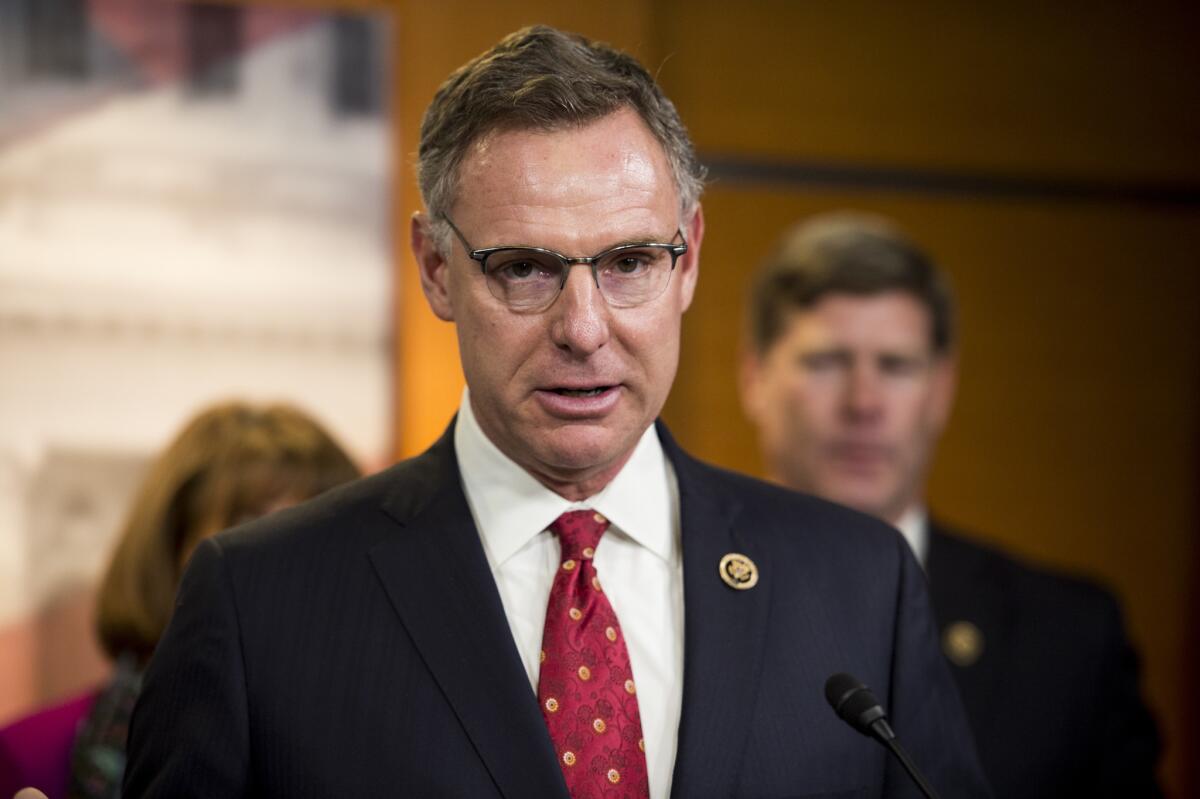
Negotiations on a bill to fund the government and other important year-end congressional business have led House leaders to cancel a congressional delegation scheduled to travel to Paris for the climate talks.
A spokesman for Rep. Scott Peters (D-San Diego) confirmed that he was selected to be part of the House delegation, and that the trip had been canceled because of votes scheduled Thursday. Other California members scheduled to attend were Rep. Doris Matsui (D-Sacramento), Rep. Jared Huffman (D-San Rafael) and Rep. Lois Capps (D-Santa Barbara).
At least a dozen House members were scheduled to leave Washington on Thursday afternoon after the votes.
But with no deal in sight for a spending plan to avert a government shutdown, Majority Leader Kevin McCarthy (R-Bakersfield) warned Tuesday that votes could occur Friday and through the weekend.
According to a staff member with knowledge of the trip, as many as 25 members were on the roster of possible attendees -- about 10 Republicans and 15 Democrats.
A delegation of 10 Senate members left last Thursday after votes and returned over the weekend.
California Senate leader Kevin de León Skypes with L.A. students from Paris
Say, what?
With a new draft of the climate agreement just released and a little more than two days before the conference is set to close, here's what we're overhearing:
'It has to fly' at home
Island nations are keeping up the pressure on negotiators at the Paris climate talks for a strong accord against global warming.
Tuvalu Prime Minister Enele Sosene Sopoaga said a new draft accord released Wednesday is "looking good," but warned "the next few hours are extremely important." The talks are scheduled to end Friday.
He said he considers it an "achievement" that key issues are still in the latest draft, such as responsibility for damages caused by future climate change, even though the final language remains unresolved.
The foreign minister of the Marshall Islands, Tony De Brum, said he met with U.S. Republican members of Congress who warned that a Paris accord might not "fly at home."
De Brum, however, says "it has to fly ... there has to be commitment from everyone. It doesn't matter what party they belong to."
Making the juice for your juice
Live presentation on California actions
At 8:45 a.m. PST, the State Department is airing a presentation titled State of California, Not Just California Dreaming: Climate Action from the "Golden State."
*The event appears live. After the hourlong California presentation, the link will periodically show other State Department presentations.
John Kerry pledges more cash in push for climate deal
With days left to meet the deadline for an international deal on climate change, Secretary of State John F. Kerry issued a call to action Wednesday, saying the U.S. would double its contribution to help vulnerable nations adapt to global warming, and urging other countries to do their part to confront the problem.
Two weeks of talks outside Paris, the culmination of years of effort by the United Nations to strike a deal to fight climate change by reducing greenhouse gas emissions, are scheduled to wrap up Friday.
"If we just continue down the current path, with too many people sitting on their hands, waiting for someone else to take the responsibility, guess what, the damage is going to increase exponentially," Kerry said. “To cut to the chase: Unless the global community takes bold steps now to transition away from a high-carbon economy, we are facing unthinkable harm to our habitat, our infrastructure, our food production, our water supplies, and potentially to life itself."
Rising global temperatures already pose “an existential threat” to some countries, including small islands in danger of disappearing because of rising sea levels, Kerry said. “We are prepared to do our part, and we will not leave the most vulnerable nations among us to quite literally weather the storm alone.”
He said the United States would in the next five years double the grants it provides for climate adaptation, currently worth more than $400 million a year. The funds are part of a previously agreed commitment by wealthy nations to mobilize $100 billion a year by 2020 to help developing countries cope with global warming and transition their economies to solar, wind and other clearer energy sources.
But he said developing nations would also need to contribute to the extent they can to raise the necessary funds and reduce global emissions.
"Make no mistake: If a global community cannot come together and refuses to rise to this challenge — if we continue to allow calculated obstruction to derail the urgency of this moment — we will be liable for a collective moral failure of historic consequence," Kerry said. “That’s why we need to act within the next 36 to 48 hours. We need to get the job done.”
An intermission as negotiators pore over new text
A new draft of a potential climate agreement was released on Wednesday, and negotiators will be spending the afternoon reviewing the text before meeting again in the evening.
French Foreign Minister Laurent Fabius said there has been progress, but he cautioned that "nothing is agreed until everything is agreed.”
The draft has been whittled down to 29 pages, a nearly 20-page reduction from over the weekend.
The negotiations have provided a "crystallization of political points that still need a lot of work," said Christiana Figueres, the top United Nations climate official.
Hot off the presses
New draft of climate deal scheduled to be released
The clock is ticking away in Paris.
France plans to present delegations with a revised draft text of a possible climate agreement on Wednesday afternoon, despite doubts that negotiators would finish it on time.
High-level ministers from countries around the world have been working furiously to come up with an agreement, including meeting on Sunday which was traditionally a day negotiators were allowed a break.
They have been debating issues such as who will pay for the cost of global warming and how progress will be monitored.
The document would be a honed-down version of the draft text that nearly 200 countries adopted on Saturday.
French Foreign Minister Laurent Fabius, who is overseeing the fortnight of talks in Le Bourget, just outside Paris, has been pushing for a swift resolution so that negotiations do not spill over into the weekend. He wants Wednesday's draft text to form the basis of a final deal that will be submitted Thursday. This would then be presented for approval by Friday's overall deadline.
U.S. energy secretary tracks climate talks in Paris
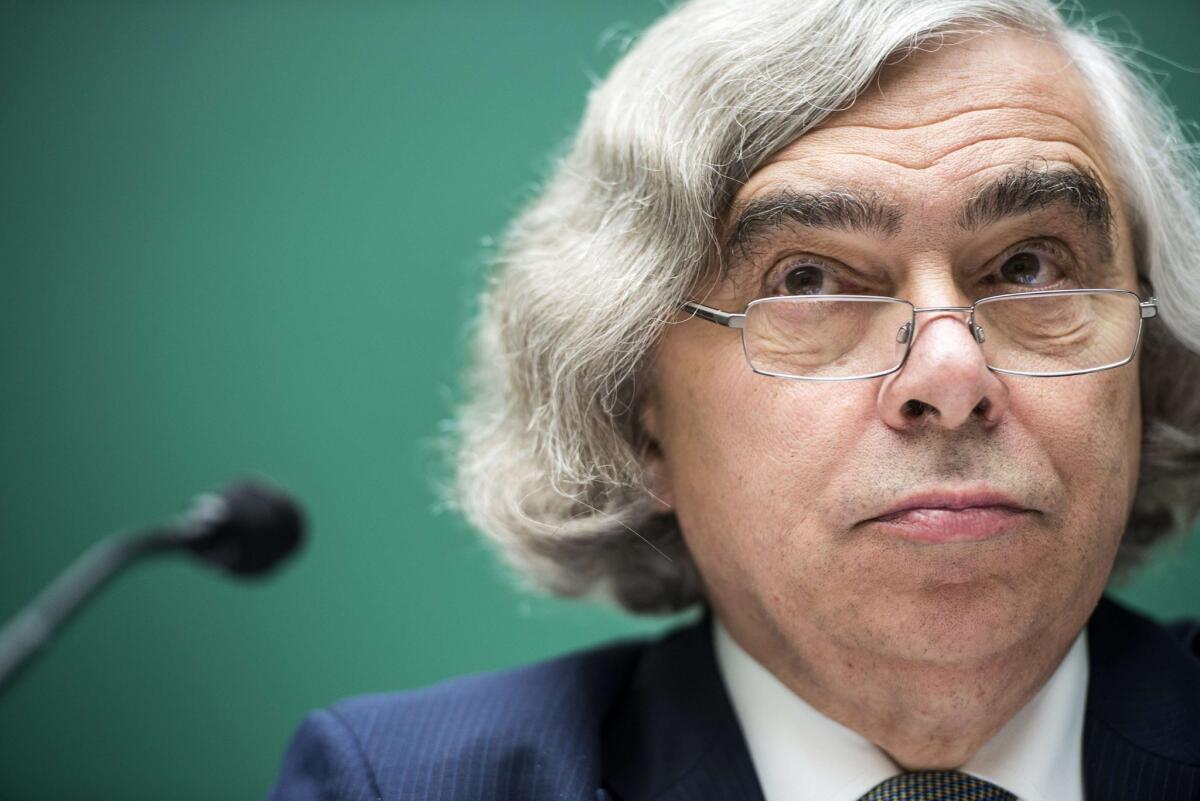
During the negotiations over Iran’s nuclear program, U.S. Energy Secretary Ernest Moniz played a key part in sealing the deal. But here in Paris, he's played more of a supporting role for the United Nations summit on climate change.
“This is not Iran,” he said in a conversation with reporters. Nonetheless, he’s been keeping tabs on the negotiations during his trip to Paris, which ends on Wednesday.
One of the sticking points, Moniz said, continues to be transparency, meaning the process for tracking whether countries are making progress on their emissions targets. In addition, the United States would like to see a way for countries to reconvene in the coming years and ramp up their ambitions.
Moniz has been pushing for more energy innovation, and he’s been working with Gov. Jerry Brown. They announced this week that an international summit for energy ministers will be held in San Francisco next year.
Brown said he hopes they can “drink from the waters of creativity that flow through our state.”
Kicking off another day in Paris
Obama is following talks closely
White House Press Secretary Josh Earnest told reporters in his briefing Tuesday that President Obama is keeping close track of the activities in Paris.
Earnest said that Obama early Tuesday called Indian Prime Minister Narendra Modi to discuss the negotiations, and that he probably would speak with other world leaders all week as talks continue at the summit.
"He’s following this quite closely. He’s getting regular updates from his team in Paris about the status of the negotiations. So it’s something that he continues to follow closely," Earnest said.
Reporters asked whether the president is optimistic about chance of a deal being reached.
Yes, Earnest said, "but primarily for the reasons that he said when he was in Paris last week, which is we have -- even in advance of the Paris negotiations -- we saw the international community mobilize to make significant commitments to cut carbon pollution."
Earnest said the United States has been playing "a leading role," which has resulted in "significant, specific commitments from a large number of countries, and we’re optimistic about the eventual outcome."
Environmental groups back U.S. clean power plan
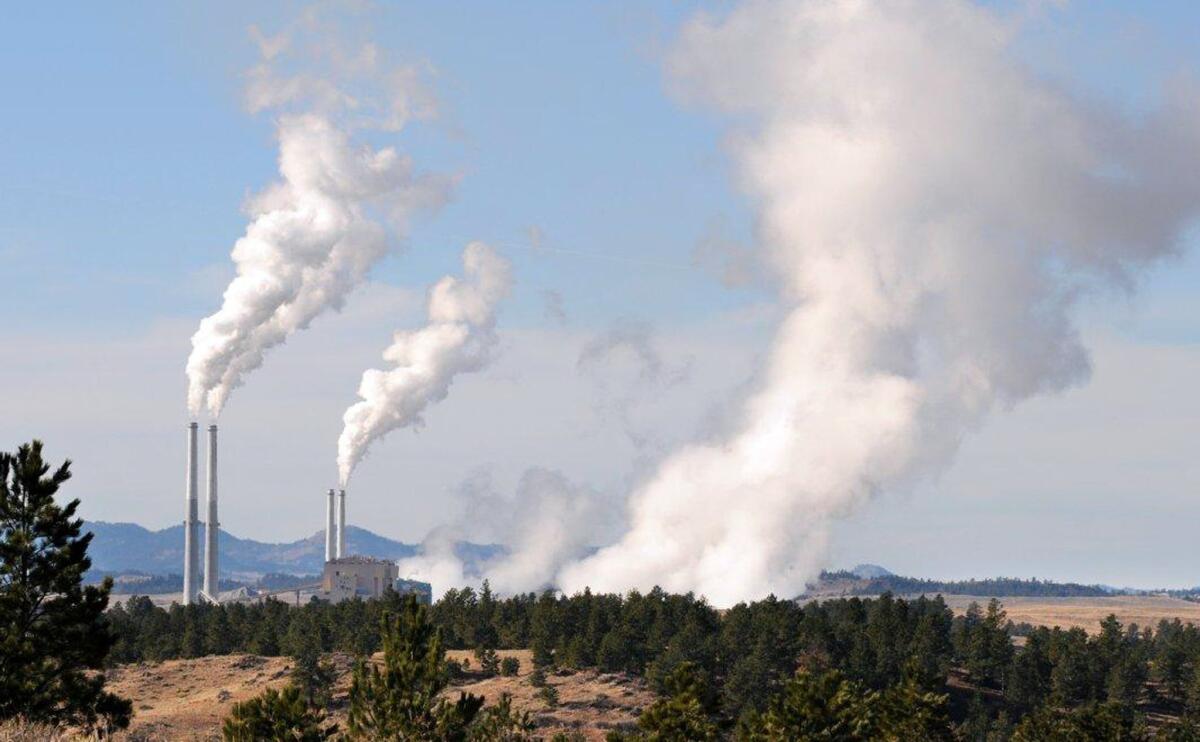
President Obama’s Clean Power Plan has helped give the United States credibility in the global climate talks underway in France. It has also given the president plenty of trouble at home.
The plan, which reduces carbon pollution from power plants, is scheduled to take effect Dec. 22, but it has come under attack from a wide array of American business groups and mostly Republican elected officials.
Twenty-seven states have sued to stop the plan, as have industry groups including the National Mining Assn. and the U.S. Chamber of Commerce.
“The EPA’s rule is unlawful and a bad deal for America,” Thomas J. Donohue, president and CEO of the chamber, said in October, after the rule was published in the Federal Register. “It will drive up electricity costs for businesses, consumers and families, impose tens of billions in annual compliance costs, and reduce our nation’s global competitiveness—without any significant reduction in global greenhouse gas emissions.”
On the other side, at least 16 states, several cities, various power companies and other groups have filed legal motions in support of the Clean Power Plan, and it has wide support among environmental groups and many Democrats.
On Tuesday, a broad group of environmental groups filed a motion against opponents’ efforts to stop the new rule. The groups said opponents’ “caricatures” of the plan “bear no similarity to the actual rule,” and they emphasized that the rule does not require emission limitations to begin until 2022.
Once in effect,” they wrote, “emission reductions will phase in gradually through 2030, allowing each state to determine an optimal glide path for compliance.”
The motion included statements of support from two former heads of the Federal Energy Regulatory Commission and a former secretary of state, Madeline Albright, who cut to the chase on the question of the importance of the plan to the talks in France.
“A stay of the Clean Power Plan could derail the international momentum to implement the emission reduction commitments achieved at the Paris Climate Conference,” Albright said.
The various suits and motions have been consolidated into a single case before the U.S. Circuit Court of Appeals in Washington, D.C.
The groups filed their motion on the same day that one of the plan’s principal architects, Gina McCarthy, the head of the Environmental Protection Agency, visited the Paris conference to promote its role in a potential international agreement.
California billionaire Tom Steyer has big megaphone, rare access to top state officials on climate change
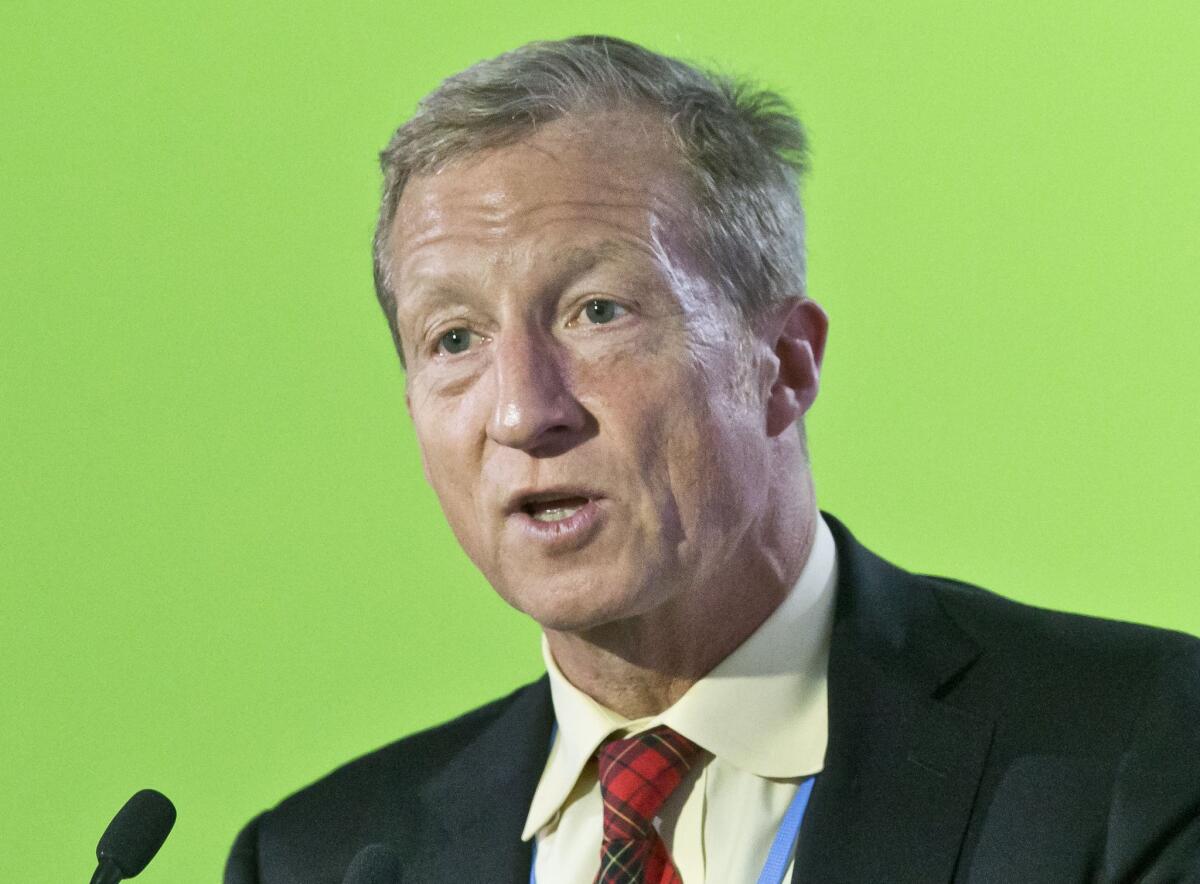
Tom Steyer, the influential California environmentalist, speaks on a panel at the U.N. climate summit in December.
Sitting under a soaring ornamental ceiling in a museum near the Seine, Gov. Jerry Brown gave thanks for the political backdrop that has enabled California's tougher environmental rules.
“If it weren’t for sympathetic legislators and powerful constituencies, then California wouldn’t be where it is today,” he said during a Monday event.
One of those powerful constituencies was next to him onstage: Tom Steyer, the environmental activist, former hedge fund manager and deep-pocketed Democratic donor. The U.N. summit on climate change has showcased his political influence, and it has provided him with a new platform for pushing clean energy policies.
Besides his onstage discussion with the governor, Steyer, 58, has led a panel of California business leaders and spoken at the conference center where negotiators are working on an international climate accord.
On Tuesday morning, the billionaire who flew first class to Paris sat in the downstairs lobby of a luxury hotel drinking coffee out of a paper cup and wearing pants frayed at the cuff.
“There is something that has to get done here,” he said in an interview. “This is an opportunity for people in California to try to make the case for the way that we’ve done things.”
Ticktock, world leaders, the ice is melting
At the start of the climate summit, a dozen icebergs, freshly plucked from Greenland, were deposited in a circle at the Place du Pantheon. Part of an art installation called "Ice Watch" by Danish-Icelandic artist Olafur Eliasson, the chunks of ice were as massive as 10 tons and meant to melt as world leaders attempt to craft an agreement nearby.
On Tuesday evening, with just three full days left before the summit is scheduled to close, much of it has disappeared.
Jerry Brown gets unwelcome reception after forestry talk
Although Gov. Jerry Brown has generally enjoyed warm receptions in Paris, protesters demonstrated after one of his speeches on forestry Tuesday evening.
Activists have expressed concern that California climate policies could have a chain reaction that forces indigenous people from their land in the Southern Hemisphere. Brown administration officials say they're taking steps to ensure that doesn't happen.
"I agree with you," the governor said to the shouting demonstrators before leaving the room.
The issue involves allowing companies to purchase "carbon offsets," which means financing a project that reduces emissions elsewhere instead of cutting pollution at the source. Preserving forests -- a policy known as REDD, for "reducing emissions from deforestation and forest degradation," is one type of offset.
The protesters say they want to make sure that if offsets are purchased in someplace like Acre, Brazil, no indigenous people are forced off the land when the forest becomes a protected area.
Mary Nichols, chairwoman of the California Air Resources Board, said no offsets would be purchased until the state can ensure that won't happen.
California's not-so-well known climate change leader
By the time she leaves office next year due to term limits, state Sen. Fran Pavley will have left a very big mark on California's climate change efforts. And while she's not a household name in the Golden State, she's well known to those attending the U.N. summit in Paris.
It was Pavley (D-Agoura Hills) who wrote the 2002 law that limited carbon emissions from auto tailpipes, adopted in 2014 by the Obama administration. And it was Pavley who authored the 2006 climate change law that then-Gov. Arnold Schwarzenegger championed as a global game changer, with implementation now being overseen by Gov. Jerry Brown and the state's Air Resources Board.
"When policymakers set clear goals to reduce climate pollution, they can unleash incredible innovation in the private sector to benefit consumers, the environment and the economy," wrote Pavley on Monday in a column posted online by state Senate Democrats.
So what's she got in store for 2016? Another effort to push California toward lower emissions from vehicles.
"There is still work to be done if we are to reach that target," writes Pavley, "and one of my goals for the coming legislative year is to develop thoughtful ways to ramp up the development of low-carbon fuels for the marketplace."
California Legislature to consider new caps on diesel exhaust, hydrofluorocarbons in 2016
As California's delegation in Paris considers some of the more far-reaching solutions on climate change, one state legislator who's part of the team says he intends to think locally come 2016.
Chris Megerian reports that state Sen. Ricardo Lara (D-Bell Gardens) will introduce legislation next month to reduce so-called "short-lived climate pollutants," which include fumes from diesel exhaust and hydrofluorocarbons, the chemicals used in air conditioners and refrigerators.
This is Lara's second effort on these kinds of greenhouse gas emissions. The Democratic legislator wrote a bill signed by Gov. Jerry Brown in 2014 to require an assessment of these emissions by the state Air Resources Board.
The new bill will go further, requiring reductions in these locally prevalent emissions by 2030.
India, other nations criticize developed countries for not doing enough as clock ticks down
India's environment minister criticized developed countries on Tuesday, saying they had offered inadequate support to developing nations in the fight against climate change. During a news conference with ministers from China, Brazil and South Africa -- a quartet known as the BASIC countries -- Prakash Javadekar said that the clock is ticking on the negotiations and that developed nations have not yet gone far enough.
"We remain disappointed with the low level of climate ambition and support provided by the developed countries," Javadekar said. "It is imperative that developed countries who have the historical responsibility and also large capability must take the visible lead in cutting emissions and providing financial and technological support to the developing world. But unfortunately it has not come the way it should have."
Javadekar said the BASIC countries have shown that they are committed to aggressively tackling climate change, but developed nations have to shoulder a fair share of the burden.
The four ministers called for all countries to show flexibility in order to reach a comprehensive, ambitious and binding agreement. "It's time to manage solutions. It's not time to postpone decisions," said Izabella Teixeira, Brazil's environment minister.
Dispatch from Rome
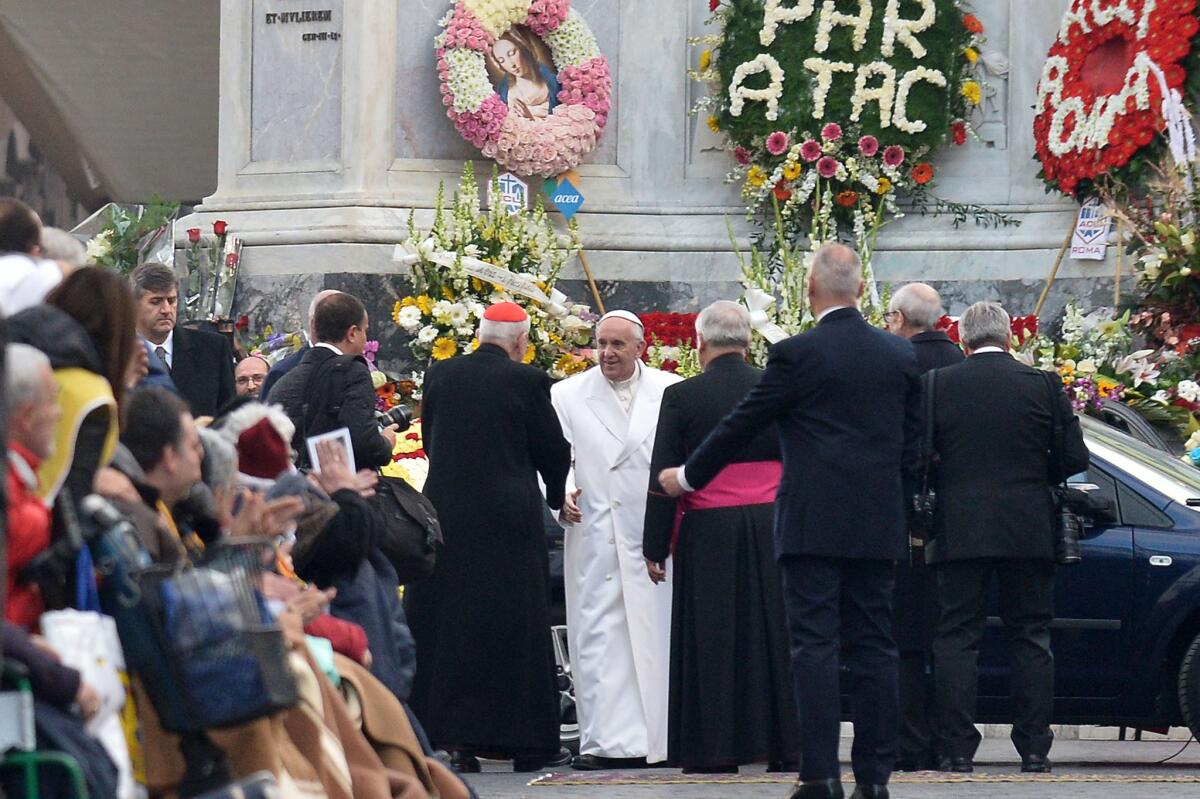
Pope Francis leaves after a prayer at the statue of the Virgin Mary during the annual feast of the Immaculate Conception at the Spanish Steps in Rome.
In a first for the Vatican, St. Peter’s Basilica will be illuminated Tuesday evening by nature photographs projected across its marble facade to coincide with the United Nations talks on climate change in Paris.
Organized by a collection of humanitarian groups that include Vulcan Inc., created by Microsoft cofounder Paul Allen, the one-time event reflects Pope Francis’ strong support of the fight against climate change. He set down his position on the issue in a June encyclical on rampant consumerism and environmental damage entitled “Laudato Si,” (Praise Be to You).
Huge images by photographers Sebastiao Salgado, Steve McCurry and others were due to be projected onto the exterior of the basilica at 7 p.m.
The event, which was also supported by Hong Kong tycoon and philanthropist Li Ka-shing, coincided with the first day of the Vatican’s Holy Year, during which Roman Catholics can pass through "holy doors" at St. Peter’s and other basilicas to gain an indulgence for their sins.
Some 50,000 pilgrims joined Francis for a Mass on Tuesday morning to launch the year, amid heavy security in the wake of the Paris attacks. Pilgrims passed through metal detectors to enter St. Peter’s Square for the event.
A sweet incentive for a climate deal?
Back in U.S., divisions and indifference on climate change
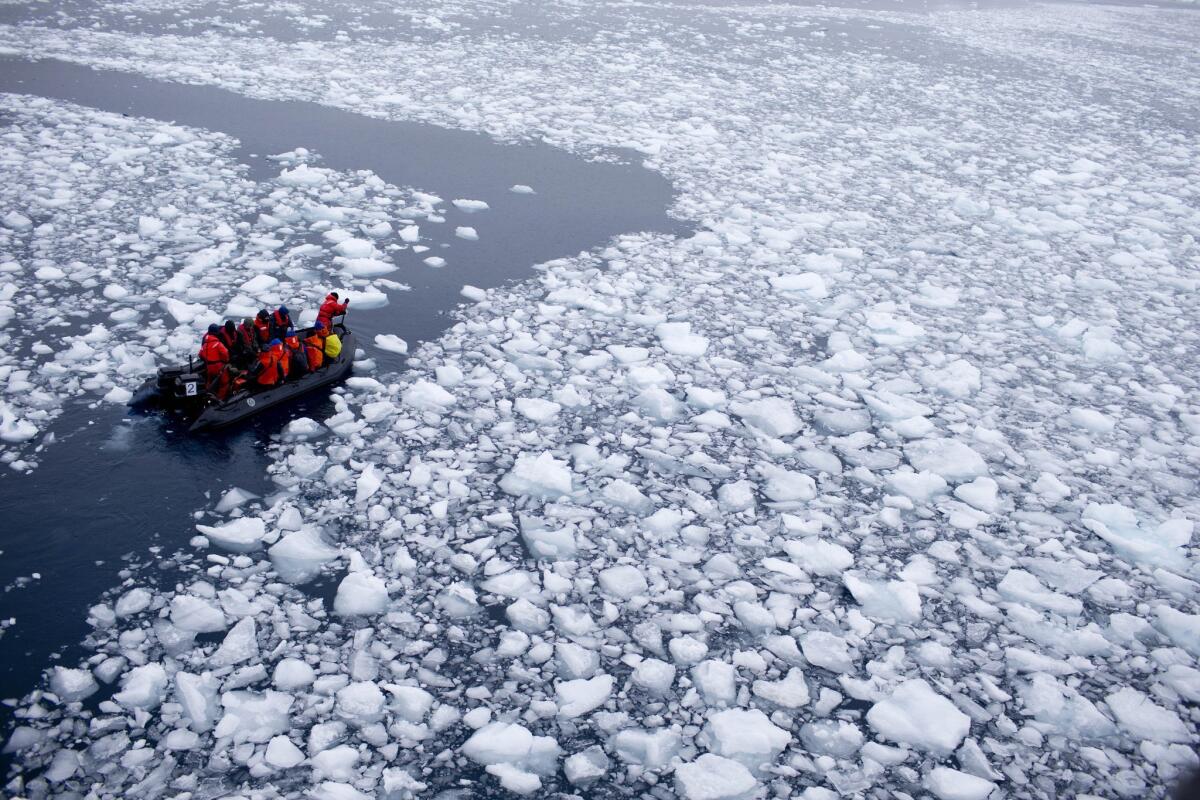
Negotiators are hammering out a climate change deal in Paris, but the U.S. political landscape remains deeply divided about the issue, and the wider American public is indifferent. That is the analysis put forward by Elaine Kamarck, a senior fellow in the governance studies program at the Brookings Institute.
Since 2001, the issue of climate change has become increasingly partisan. A recent Gallup poll shows that 79% of Democrats now believe that Earth’s temperature rise in the last century is mainly due to human activities, compared to 41% of Republicans.
In terms of the nonchalant public attitude, Kamarck points to several reasons including the fact that climate change is largely an abstract, invisible threat. Research shows that the public fails to take news stories about disappearing islands or the shrinking polar ice caps seriously, and more than half the U.S. public does not think that global warming will pose a serious threat in their lifetime.
It seems arguments about creating a better world for future generations also carry little weight. Previous environmental success stories – such as turning Ohio's polluted Cuyahoga River back into a thriving ecosystem – may also have lulled the public into a false sense of security that any damage can be undone.
"Climate change is perhaps the toughest public policy challenge ever — mostly because it lacks immediacy," Kamarck said in an article posted on the think tank's website. "Even as more and more people come to accept the science behind it, climate change is still a distant threat. Making good on any agreement that will come out of Paris will need more than Republican support. It will need for the public to see this as today’s, not tomorrow’s problem. It will need the functional equivalent of the fire in the Cuyahoga River."
Red tape? Jerry Brown sees the bright side
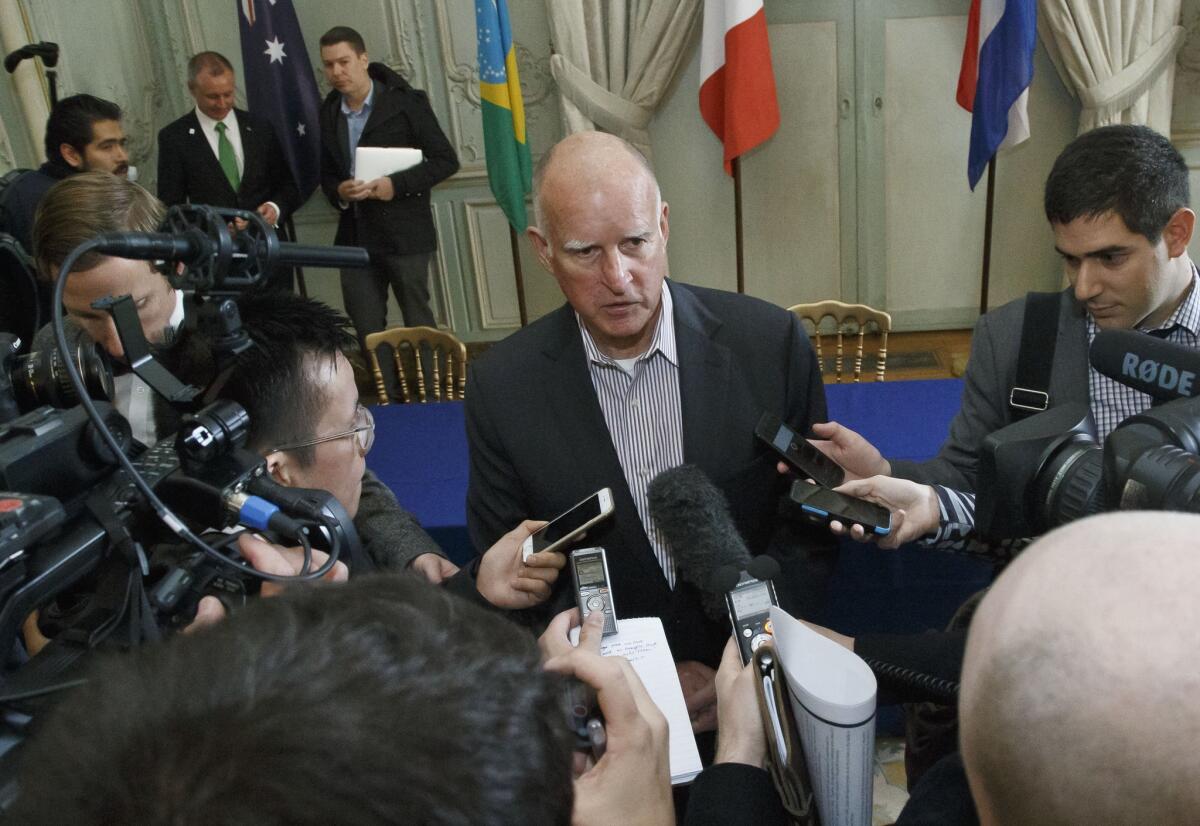
Wherever Gov. Jerry Brown goes at the United Nations summit on climate change, he's talked about finding the political will to deal with the issue.
For him, that also means something few politicians are willing to openly embrace: regulations. He describes them as the "coercive power of government" to force environmental changes.
Read more about his comments here.
Sitting down with California's political odd couple
Chris Megerian interviewed Gov. Jerry Brown and former Gov. Arnold Schwarzenegger.
This is what they said.
Obama speaks with Brazilian president
The White House announced that President Obama spoke by phone today with Brazilian President Dilma Rousseff "to discuss ongoing progress in the Paris climate conference."
The leaders "emphasized their personal commitment to reach an ambitious climate change agreement and their interest in working together to drive success" and "agreed to continue to stay in close touch as the conference continues," the White House said.
China and the world turn to California for climate change expertise
Although California lacks a formal seat at the negotiating table while countries seek an international accord on climate change, the state has something many places do not — a track record of ambitious environmental programs that could be imitated around the world.
What Jerry Brown and Ban Ki-moon talked about
Meet Todd Stern, the top U.S. negotiator in Paris
So who is the man responsible for guiding negotiations on behalf of the U.S. during the climate talks?
Environment & Energy reports that he's an unflinching attorney who "doesn't mind being the bad guy."
Todd Stern, the U.S. special envoy for climate change and lead U.S. negotiator, loves spy novels, the Chicago Cubs and is known for being blunt.
Activists joke that his name is similar to the German phrase for "death star."
Read the full profile here .
Schwarzenegger: 'I don't give a damn if you believe in climate change'
After a weekend of high profile events in Paris urging new efforts to combat climate change and reveling in his role in charting California's course, former Gov. Arnold Schwarzenegger posed an interesting question on Monday to critics: Who cares if we're wrong?
In a column posted on his Facebook page , Schwarzenegger said the more important issue lies in the answers to three questions, questions that he suggests go to the heart of the future of energy and fuel needs worldwide.
"First -- do you believe it is acceptable that 7 million people die every year from pollution?" writes the former governor, citing a statistic from the World Health Organization .
From there, he raises the issue of what happens as fossil fuel resources start to dwindle and renewable energy becomes more important.
"I, personally, want a plan," writes Schwarzenegger. "I don't want to be like the last horse and buggy salesman who was holding out as cars took over the roads. I don't want to be the last investor in Blockbuster as Netflix emerged."
And in classic Schwarzenegger style, the third question paints a scene in Hollywood-like fashion: suppose you had to pick between an hour in a closed room with a gas-burning vehicle or a room with an emissions-free electric vehicle.
"This is the choice the world is making right now," he writes.
Schwarzenegger, in his interview alongside Gov. Jerry Brown on Sunday, seemed fairly restrained in his comments about critics of climate change efforts in California and across the world. His Facebook post, though, ends with a much more sharply worded reply.
"To use one of the four-letter words all of you commenters love, I don't give a damn if you believe in climate change," he writes. "I couldn't care less if you're concerned about temperatures rising or melting glaciers. It doesn't matter to me which of us is right about the science."
Secretary of State John Kerry: 'We are going to see an enormous amount of movement'
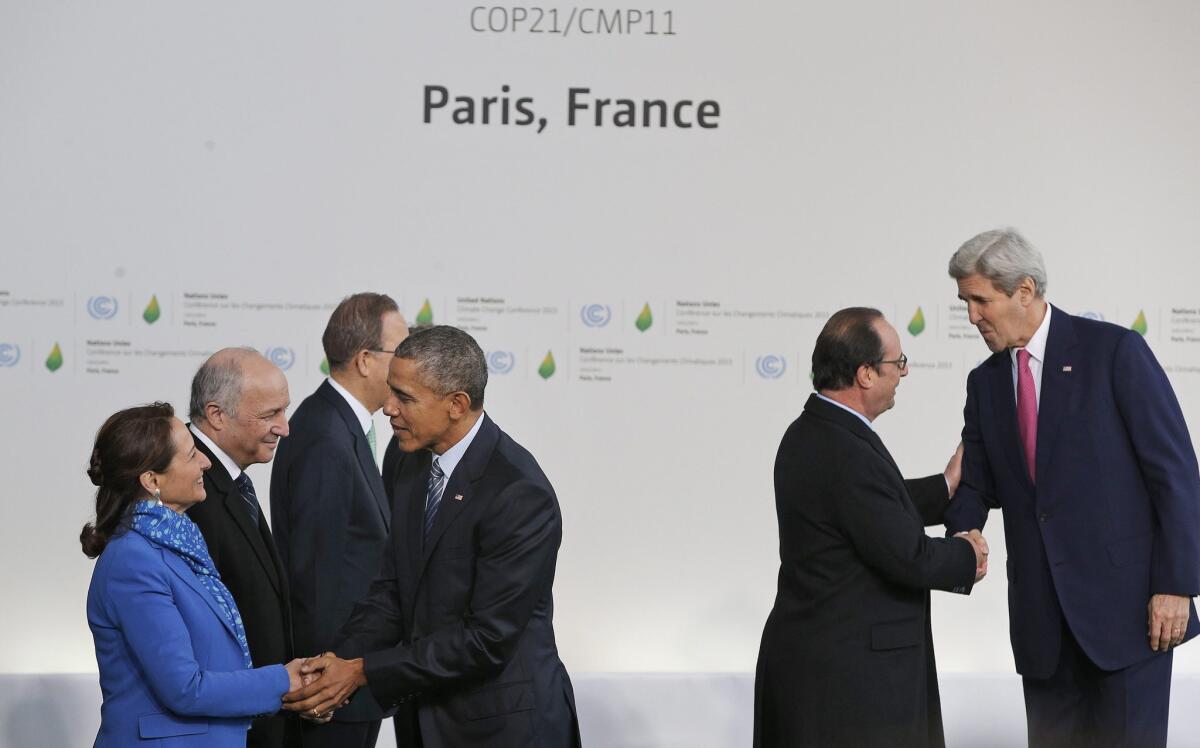
President Obama is greeted by Segolene Royal, left, French minister for ecology, sustainable development and energy, and Secretary of State John Kerry is greeted by French President Francois Hollande as they arrive in Paris on Nov. 30 for the climate change conference.
Secretary of State John Kerry said Monday that even without a specific temperature-change limit and legally binding structure, a climate change agreement that negotiators in Paris are hoping to reach this week has the potential to change the world.
Kerry said that if the more than 190 nations at the Paris conference sign on to a plan in which they have confidence, the private sector will take the reins and innovate new sustainable-power technologies that will ease climate change.
"Even without a fixed number and a legal shell, we are going to see an enormous amount of movement," Kerry told a gathering on the sidelines of the climate conference in the French capital.
"I have absolute confidence in the ability of capital to move where the signal of the marketplace says 'go' after Paris," he said.
Kerry said he was hopeful that the negotiators would reach an agreement by a Friday deadline, but would not be surprised if the talks bled over into the weekend.
"I think the stage is set, I think the attitude is currently there," he said.
Negotiations update
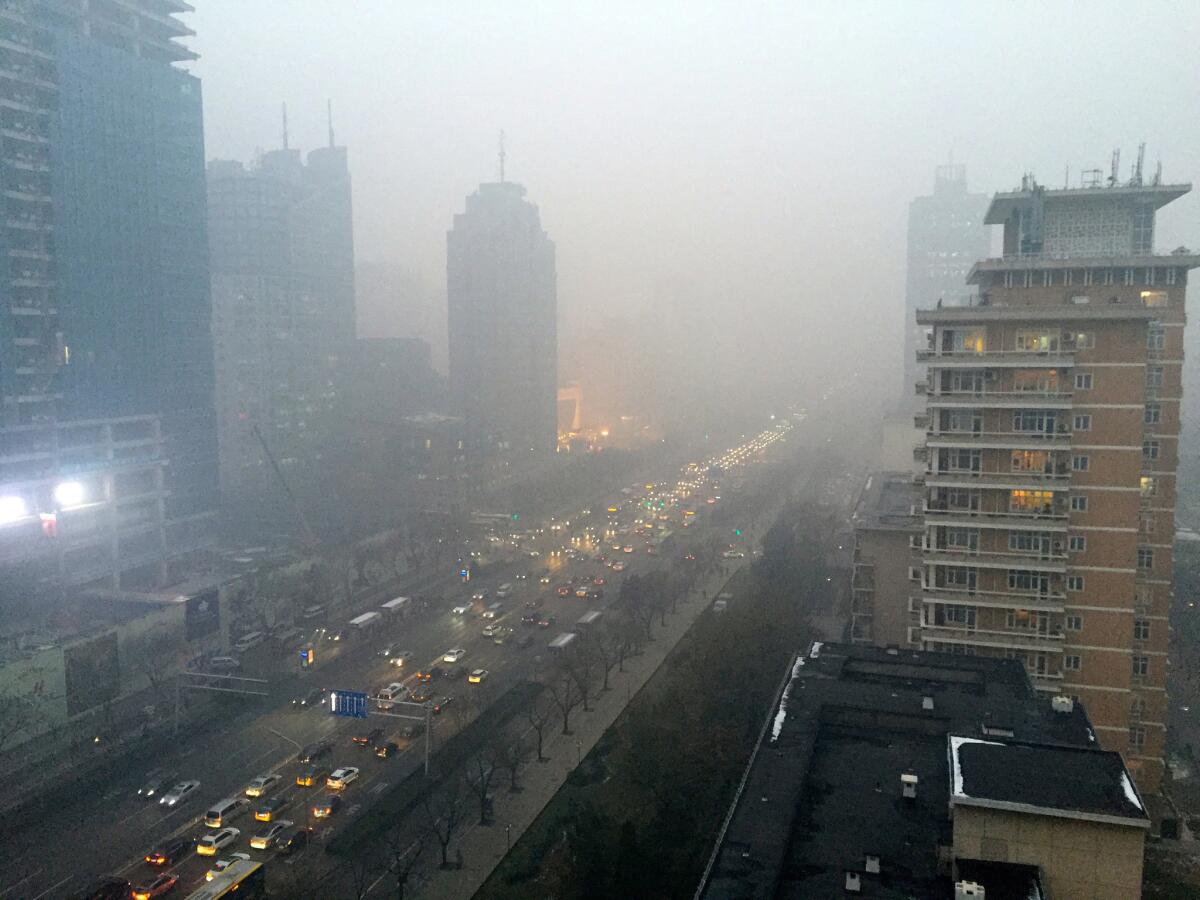
Smog hangs over Beijing’s main boulevard, Chang’an Avenue, looking west toward the Forbidden City.
The U.S. special envoy for climate change said differentiation and ambition are emerging as the two major sticking points during negotiations. Speaking at a news conference in Le Bourget on Monday afternoon, Todd Stern said the second high-level phase of talks were well underway and that ministers were "engaged." However, he added that several issues were still a long way from being resolved.
The term "differentiation" refers to the idea that different responsibilities for tackling climate change should be placed on rich and poor countries, depending on their capacity and vulnerability. The term "ambition" refers to the collective will of nations to work together to cut global greenhouse gas emissions enough to limit temperature rise to less than 2 degrees Celsius.
"The goal is to hold temperatures to, as far as possible, below 2 degrees," Stern said. "But we are working with countries ... in crafting language."
Responding to a question from the audience, Stern said there had so far been little mention of U.S. politics and the 2016 presidential election during the talks. "If I think about all of the many, many meetings I've had ... U.S. politics is by and large not really coming up," he said.
Stern ended the news conference on a somewhat positive note, saying intense discussions were underway but that he was optimistic about the outcomes ahead of Friday's deadline: "I think and hope we are making some progress, but we will see," he said.
Not legally binding?
The European Union appears to be softening its position on its demand that emissions targets in a potential Paris climate accord need to be legally binding.
EU Climate Commissioner Miguel Arias Canete on Monday told reporters he understands "the political situation in the United States," where Republicans in Congress would be unlikely to approve binding targets for limits on carbon dioxide emissions. Many Republicans question whether climate change is happening and oppose emissions limits out of concern that it would hurt U.S. industry and jobs.
Canete said in a statement in Paris that the EU still favors internationally binding targets, but "at the same time, we have signaled our readiness to discuss alternative approaches which would ensure that the Paris agreement can provide a robust legal framework and maximum certainty in parties delivering on their targets."
The EU has been among the most outspoken advocates of binding targets.
Brown meets with U.N. Secretary-General Ban Ki-moon
California's ideas on reducing greenhouse gas emissions
Earlier today, Gov. Jerry Brown joined NextGen Climate founder and President Tom Steyer and Natural Resources Defense Council President Rhea Suh in a session titled "leading by example" to discuss government and business efforts to reduce greenhouse gas emissions in California. Here are a few tweets from the event.
Ending fossil fuel subsidies
The head of the International Energy Agency is urging an end to government subsidies for fossil fuels, as world governments try to reach an accord to slow global warming.
"Last year, about half of all the new power plants were renewables," with the rest including coal, oil, gas and nuclear plants, Fatih Birol said in Paris. "In the years to come, we are expecting that out of every $10 invested in new power plants, $6 will be for renewables."
"We would like to see fossil fuel subsidies phased out," he said. "There are more than $500 billion today," which, he said, provide an incentive to continue producing emissions that scientists say are warming the planet.
Ban Ki Moon: 'Current ambition must be the floor not the ceiling'
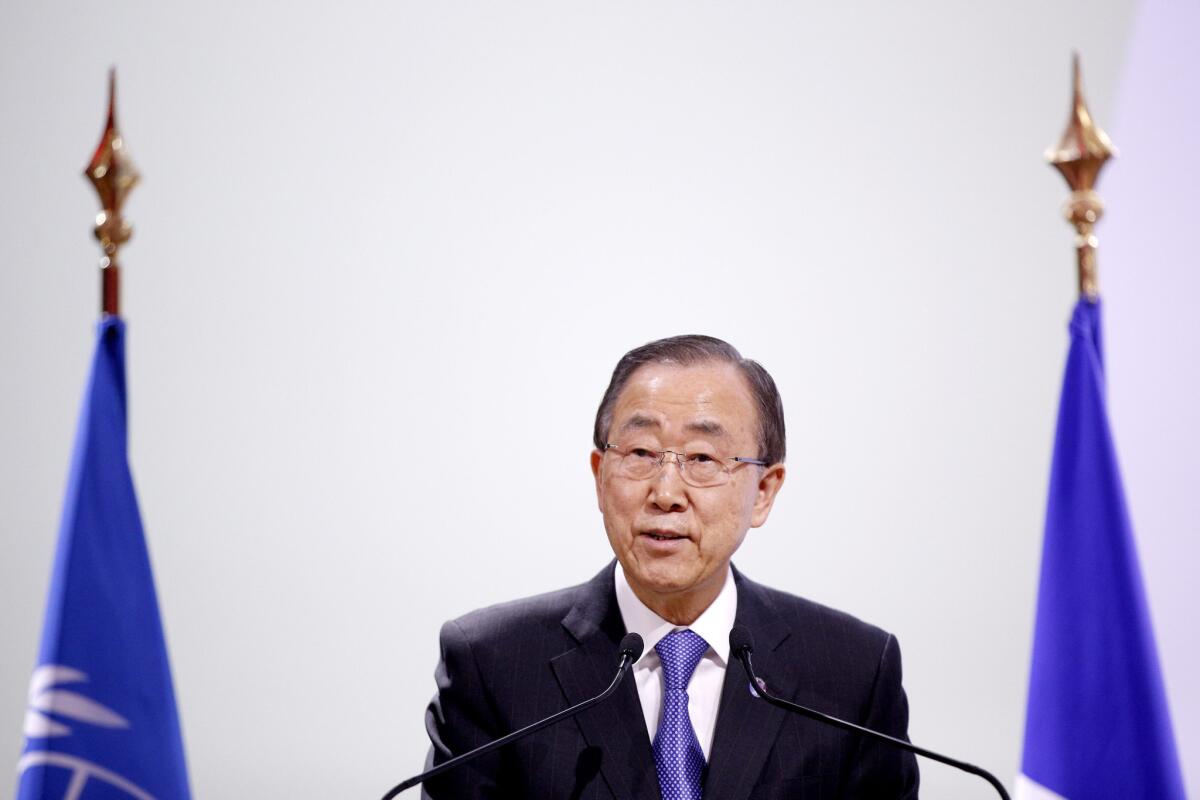
epa05058090 UN Secretary-General Ban Ki-moon delivers a speech during the ‘High-Level Segment of COP 21/CMP 11’ meeting at the COP21 World Climate Change Conference 2015 in Le Bourget, north of Paris, France, 07 December 2015. The 21st Conference of the Parties (COP21) is held in Paris from 30 November to 11 December aimed at reaching an international agreement to limit greenhouse gas emissions and curtail climate change. EPA/YOAN VALAT ** Usable by LA, CT and MoD ONLY **
U.N. Secretary-General Ban Ki Moon has called on foreign and environmental leaders to seize the moment and secure a “durable, dynamic, credible and fair” climate agreement.
During a press conference Monday morning at the start of the second phase of negotiations in Paris, he said the people of the world -- from faith and business leaders to ordinary citizens -- were calling for a “transformative agreement” and world leaders needed to rise to that challenge.
“Current ambition must be the floor not the ceiling for efforts,” Ban said. “Centuries of human endeavor and innovation have given the world great gifts. Yet we have also sown the potential seeds of our own destruction. The clock is ticking towards climate catastrophe. The world is expecting more from half-measures and incremental approaches.”
On Saturday, negotiators from nearly 200 countries adopted a draft text that will be used as the framework for the high-level talks taking place between now and Friday.
Many negotiators were disappointed that more had not been accomplished during the first week and several major issues remain unresolved, including how much financial support developing nations should receive and how to monitor whether countries are sticking to their pledges. But Ban stressed that there was still time to come up with a dynamic agreement that would make future generations proud.
“I say to you that your decisions can lay the foundation for a sustainable future where both people and planet can thrive,” Ban said. “Your work here this week can help eradicate poverty, spark a clean energy revolution and provide jobs, opportunities and hope for tomorrow.”
Talking California on Paris stage
Brown's busy schedule
Another day, another packed agenda for Gov. Jerry Brown.
Here is an edited list of the events he's participating in Monday, according to his staff.
The Climate Group – States and Regions Alliance Media Briefing
Gov. Brown will participate in a media briefing ahead of the States and Regions Alliance General Assembly, to highlight state and regional climate leadership and discuss action following the COP21, including efforts to expand the mutually complimentary Under 2 MOU and Compact of States and Regions.
United Nations Foundation – Earth to Paris Summit: California Climate Dialogue
Gov. Brown will join NextGen Climate founder and President Tom Steyer for a wide-ranging discussion on government and business efforts to reduce greenhouse gas emissions.
French Republic – U.S. State Leadership on Climate Change Event
At the invitation of France's ambassador to the U.S. Gérard Araud, Gov. Brown will deliver keynote remarks at an event in the blue zone organized by the French government to highlight aggressive climate action among American states. France's Minister of Ecology, Sustainable Development and Energy Ségolène Royal, Washington Gov. Jay Inslee and other American subnational leaders are expected to participate.
China's National Development and Reform Commission – China-California Low Carbon and Climate Change Cooperation Event
Gov. Brown and China's special envoy on climate change, Xie Zhenhua, will give remarks at an event in the blue zone organized by China's National Development and Reform Commission highlighting California and China's collaboration on air pollution mitigation, emissions trading and clean technology.
UNFCCC – Climate Action Dialogues: Subnationals Leading the Way
Gov. Brown will join mayors and governors around the world to speak at an event in the blue zone -- organized by the UNFCCC in conjunction with the Pacific Coast Collaborative, Carbon Neutral Cities Alliance, Governors' Climate and Forests Task Force -- highlighting cities and states like California that are adopting ambitious emission reduction targets, while at the same time creating economic opportunity.
United Nations Foundation – Earth to Paris Summit: California Businesses for Climate Action Roundtable
Gov. Brown and NextGen Climate founder and president Tom Steyer will convene a roundtable with top California energy, healthcare and finance CEOs and business leaders to discuss private-sector action on climate.
Kicking off a new day in Paris
Climate scientists turn to the power of religion
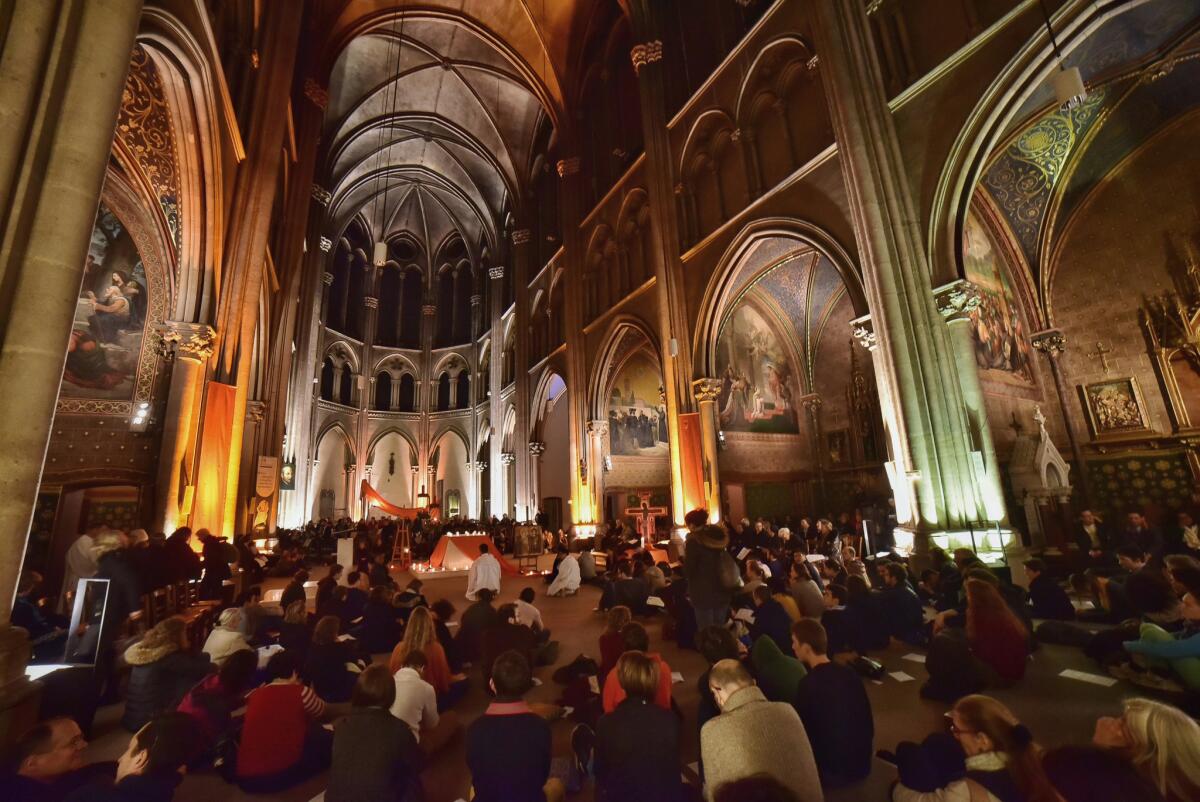
In this photo dated Saturday, Dec. 5, 2015, and provided by Taize, people pray at an interfaith service for world leaders to curb global warming during a multi-lingual service at Church St Ignatius in Paris, France. The cold hard numbers of science haven’t spurred the world to curb runaway global warming. So as climate negotiators struggle in Paris, some scientists who appealed to the rationale brain are enlisting what many would consider a higher power: the majesty of faith. (Marie Renaux/Taize via AP)
Richard Branson urges 'net zero' emissions by 2050
Richard Branson has renewed a call by business leaders for government leaders to include a goal of reducing global emissions to "net zero" by 2050, meaning no more than the planet can absorb.
The Virgin Group chief executive said to the Associated Press that a failure to include such a commitment in the Paris climate talks would result in "an alternative too horrible to contemplate." He spoke after a meeting of business leaders who gathered to discuss the talks' status.
Branson said he's confident that government leaders "will bring in an agreement, but it most likely won't go as far as the business world would like it to go."
Odd couple: Gov. Jerry Brown and ex-Gov. Arnold Schwarzenegger speak side by side
It was like the debut of an environmentally themed buddy cop drama, with a political odd couple uniting against a common foe.
In one chair was California’s governor, Jerry Brown, the cerebral Democrat known for dropping Latin phrases into Capitol press conferences.
In the other was his predecessor, Arnold Schwarzenegger, the Republican movie star who is fond of finding ways to compare political issues to his championship bodybuilding career.
It’s hard to imagine two more different people serving back-to-back in the same political office, but today they sat for a joint interview to put a bipartisan spin on fighting climate change, a key issue for both of them.
Taking matters into his own hands
Gov. Jerry Brown and his allies have been rounding up states, provinces and cities willing to set environmental targets tighter than those that are likely to be adopted at the United Nations summit on climate change.
Presidential hopeful in Paris
Jill Stein, seeking the presidency through the Green Party, is attending the summit to ask world leaders to "act urgently to save humanity from the looming catastrophe of climate change," and has some tough talk for the country she is looking to lead.
Stein issued a press release saying she is "sad to say" the United States "contributed in a fundamental way to undermining" COP21's initial purpose.
"We are now seeing a hodge-podge of voluntary pledges that adhere to no clear standards and have no mechanisms for enforcement," she said.
Stein on Tuesday will speak at an event with China’s chief climate negotiator, the president of Iceland and climate advocates at the Belong Forum being held in conjunction with COP21, the Paris Climate Conference.
She also has meetings with Green Party members of their country's parliaments Caroline Lucas of the United Kingdom, Elizabeth May of Canada and Kennedy Graham of New Zealand, and she will speak at two forums organized by nongovernment organizations.
Brown: Expand the electricity grid
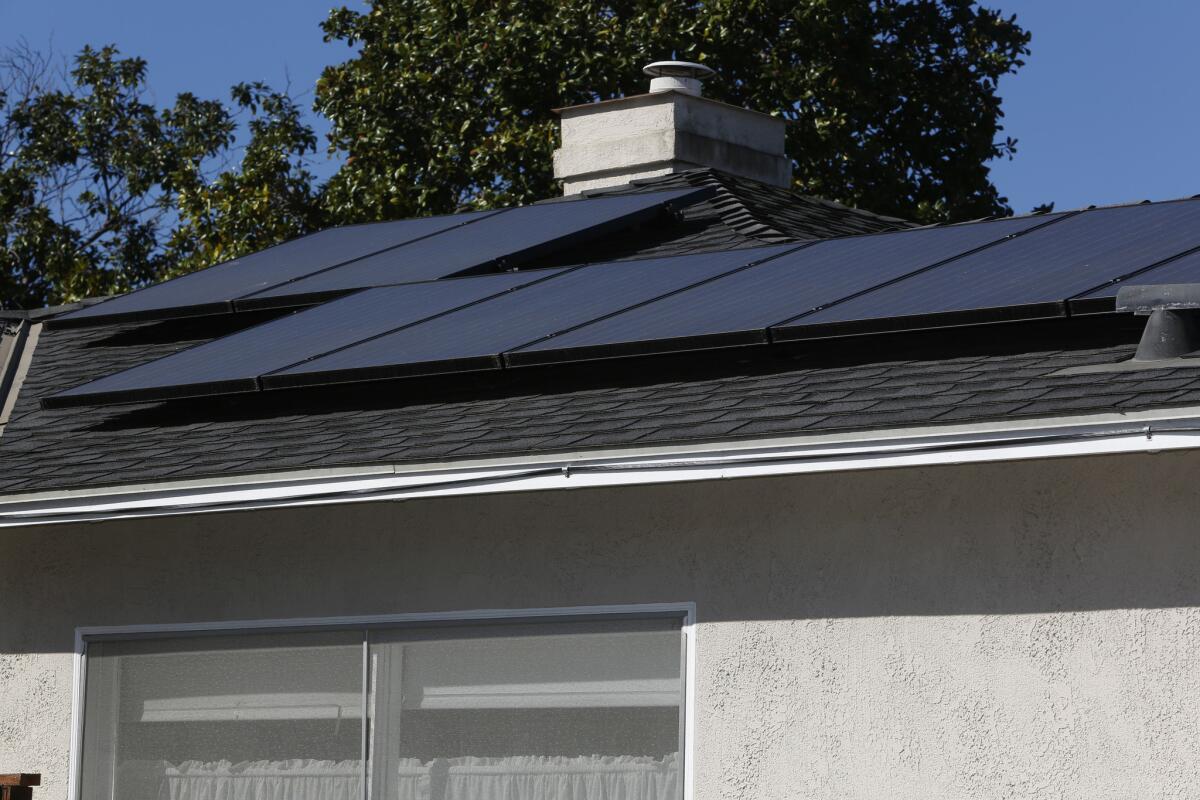
Solar panels on a home in Culver City.
As Gov. Jerry Brown touted California’s environmental policies in Paris, he also acknowledged some of the steep challenges faced while expanding renewable energy.
“The wind doesn’t blow all the time. The sun only shines for a certain number of hours,” he said Sunday morning. “So what do you do?”
Then there’s the problem of occasionally having more electricity than needed, such as when the sun shines brightly on a cool fall day and there’s little demand for power-hungry air conditioning.
“There’s a lot of electricity that’s going to waste. We have to use that,” Brown said.
Brown said the state needs more energy storage and a wider grid to distribute electricity — two issues The Times has written about.
California regulators have required utilities to invest in hundreds of megawatts of storage in the coming years, but experts say that likely won’t be enough as the state keeps increasing its renewable energy production.
The governor is also seeking to integrate California’s electricity grid with PacifiCorp, a utility serving six Western states. The effort could help spread renewable energy around the region, but some environmentalists are also concerned it would allow dirty coal power into the Golden State.
'Start signing,' Gov. Jerry Brown says
Gov. Jerry Brown: 'We're going to be a force'
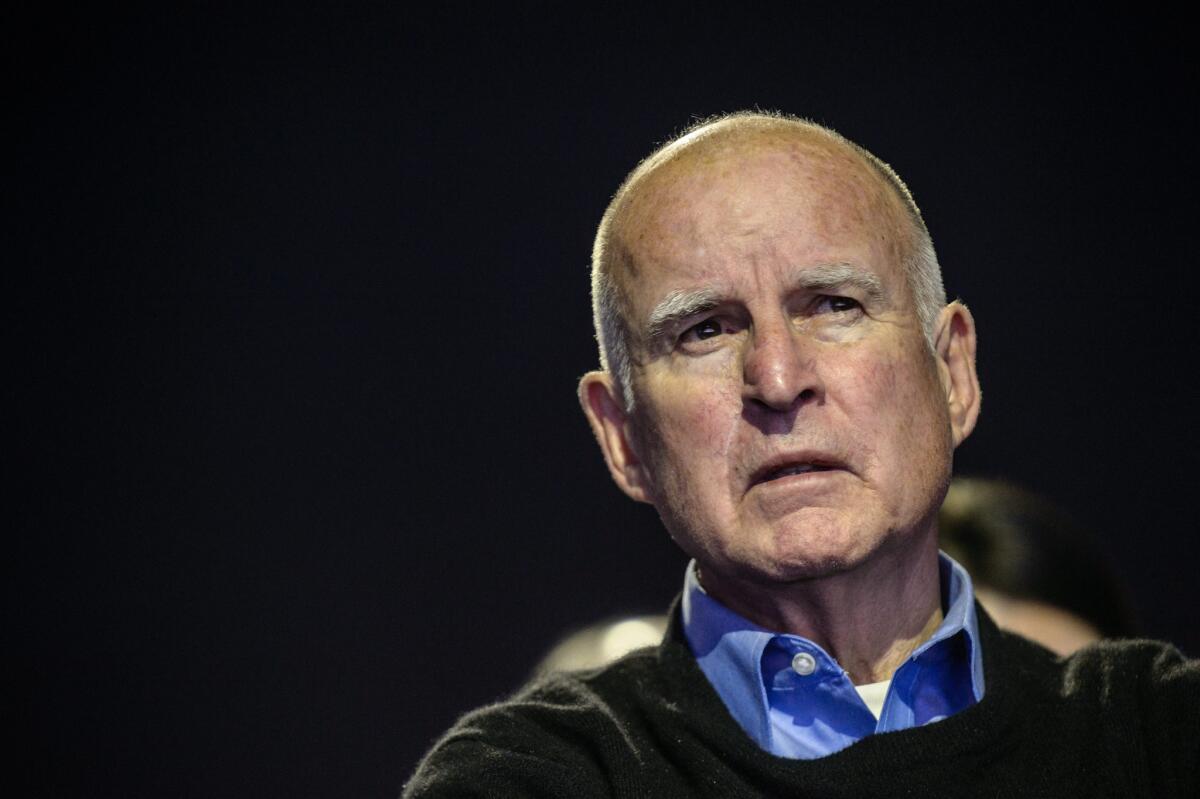
Gov. Brown attends the Action Day meeting at the COP21 World Climate Change Conference.
An additional 15 states, provinces and cities joined an international climate agreement promoted by Gov. Jerry Brown during a ceremony in Paris on Sunday.
The new members included Oakland, Seattle and Austin, Texas, as well as places in Brazil, Spain and Australia.
“We’re going to be a force to reckon with,” Brown said.
The event was hosted by the U.S. ambassador to France, Jane Hartley, who praised the governor and his allies for having “chosen to act before it’s too late.”
“This is a remarkable, remarkable achievement,” she said.
By signing the accord, signatories are committing to reduce emissions to at least 80% below 1990 levels, or less than 2 metric tons per capita, by 2050.
Franz Untersteller, the environment minister for the German state of Baden-Württemberg, said they are all “striving for the same goal, but following different paths.”
An advisor to the governor said the agreement could exceed 100 signatories by the end of the Paris summit.
Schwarzenegger and Brown on common ground
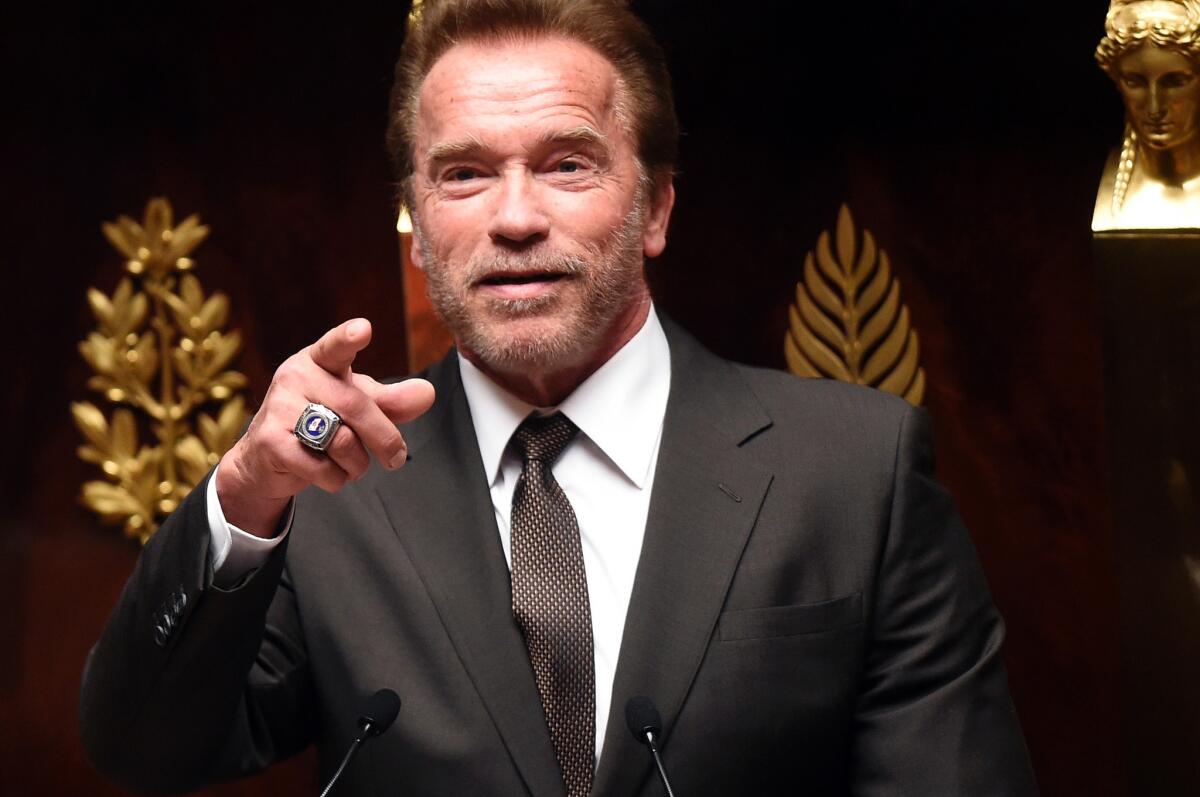
Former Gov. Arnold Schwarzenegger delivers a speech during a parliamentary meeting in Paris.
With so many Californians in Paris for the climate summit, perhaps it’s not surprising that they’ve started bumping into each other.
Gov. Jerry Brown was leaving an event at the Grand Palais on Saturday night when he ran into former Gov. Arnold Schwarzenegger, pictured above, who had been signing a few autographs nearby.
Schwarzenegger, whose administration launched some of California’s climate policies, is one of several movie stars who has traveled to Paris to support the United Nations conference.
“I want to use my celebrity power wisely,” he said in an interview before his trip. “They come to see the Terminator. But they get the message that we can do it.”
Schwarzenegger praised Brown for his environmental work, noting that his track record extends to the 1970s, three decades before Schwarzenegger became governor himself.
“I just continued building on … the foundation that was built by him,” he said.
Brown returned the compliment at an event on Sunday morning, noting Schwarzenegger had enacted some of California's key renewable energy laws.
"I picked up that and advanced it to the next level," Brown said.
That California vibe
These days the breakfast room at the Best Western Trianon Rive Gauche can feel like an outpost of Sacramento.
Many of California's representatives are staying there during the climate summit, and in the morning you can find Sen. Fran Pavley reviewing her schedule or Sen. Bob Wieckowski toting a thick briefing book.
On Sunday, Air Resources Board Chair Mary Nichols was drinking a cup of coffee when Insurance Commissioner Dave Jones walked in.
"Welcome to California," Nichols said.
Paris trip caps career-long focus on environment for Jerry Brown
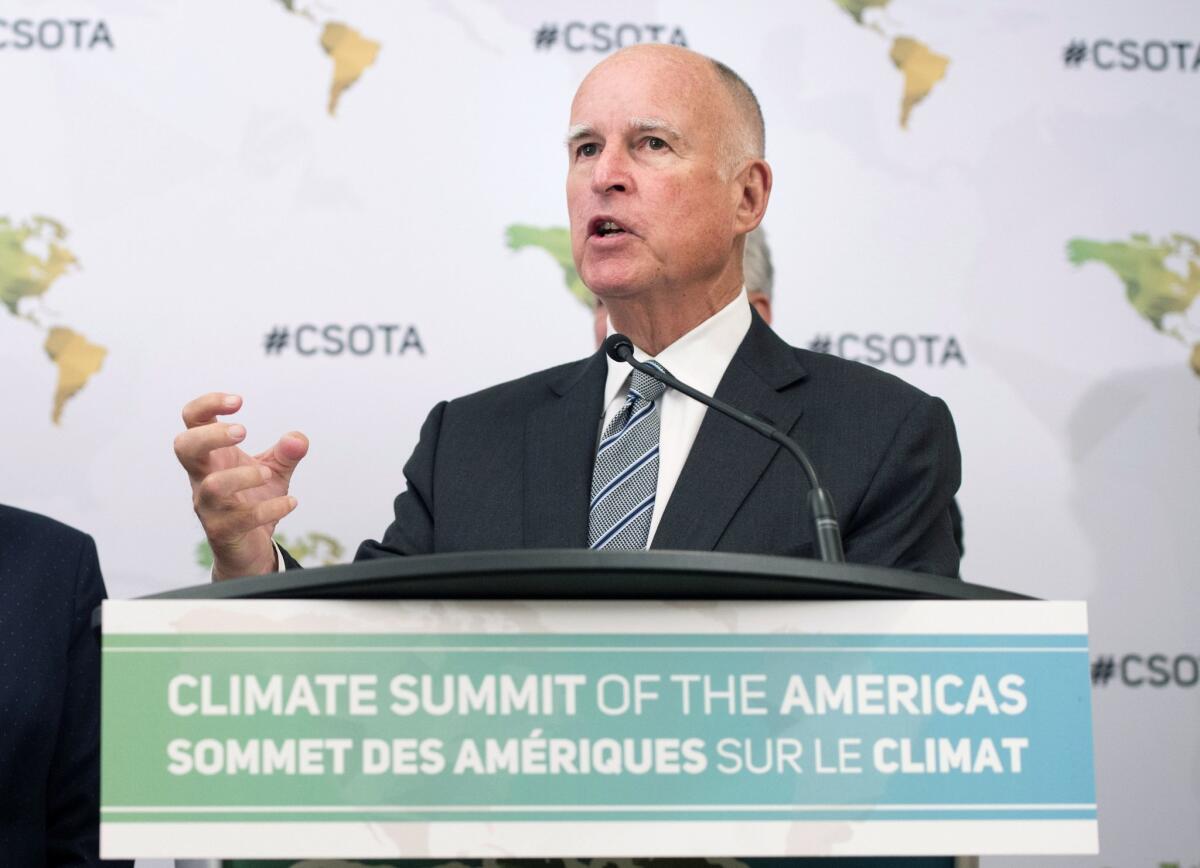
Gov. Jerry Brown speaks to reporters at the Climate Summit of the Americas in Toronto on July 8.
Decades ago, when Jerry Brown was first governor, he was viewed as something of a curiosity for his focus on environmental issues.
His views can still prove controversial, but his invitation to the United Nations summit on climate change in Paris shows how much has changed over the years.
“They’re not calling him Moonbeam anymore,” said Tom Hayden, an environmental activist and former state legislator who has worked with Brown for years. “This is his moment.”
Read our profile from earlier this week.
Brown touts Day One, releases schedule
Gov. Jerry Brown's office issued a press release and some photos summing up the California Democrat's first day in Paris.
Brown "kicked off the first of five days at the United Nations Climate Change Conference in Paris, France, participating in the UNFCCC COP21’s official 'Action Day' event and a panel with Oscar-winning director Charles Ferguson and world-renowned primatologist and conservationist Dr. Jane Goodall following a screening of the new climate change documentary, 'Time to Choose,'" the release states.
More on Brown's activities is here , and a summary of his upcoming schedule is below.
Gov. Brown gives remarks at a UNFCCC COP21 Action Day event. (Handout)
Gov. Brown meets with Paris Mayor Anne Hidalgo. (Handout)
Here is an edited version of Brown's Sunday events, as outlined by his staff.
RE-Energizing the Future Conference: Governments Leading the Way Towards a Renewable World
The conference is organized by the European Commission; International Renewable Energy Agency; Renewable Energy Policy Network for the 21st Century; Syndicate for Renewable Energy of France; and others.
State of California and U.S. Embassy – Under 2 MOU Climate Agreement Signing Ceremony
Brown and U.S. Ambassador to France Jane D. Hartley will host a signing ceremony for new signatories to the Under 2 MOU climate agreement.
2015 Global Landscapes Forum High-Level Plenary: Science Policy Exchange
Brown will deliver keynote remarks at the conclusion of a plenary session featuring international scientists and government leaders focused on bridging the divide between climate research and policy making -- a longstanding priority in California. Organizers of the Global Landscapes Forum, which is expected to be one of the COP21's largest "side events," include the French government; Center for International Forestry Research; UNEP; the World Bank; and others.
Noticed: Brown buys carbon offsets
A news release from Gov. Jerry Brown's office has a little factoid tucked amid photos from the governor's first day in Paris and a detailed schedule of California's role in the climate talks.
Meanwhile, in the other Paris
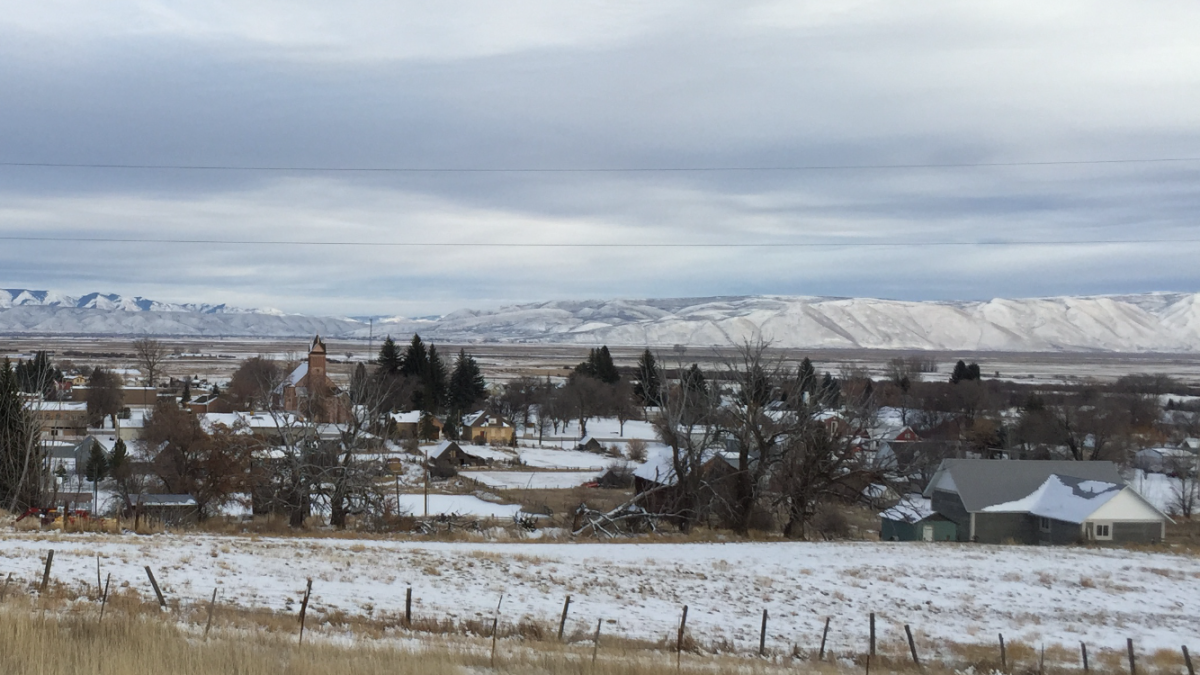
In tiny Paris, Idaho, climate change isn’t much of a concern. Residents say they worry more about terrorism and the local economy.
In tiny Paris, Idaho, climate change isn't much of a concern. Residents says they worry more about terrorism and the local economy. (William Yardley / Los Angeles Times)
In the fall of 1863, two families pushed into the northern edge of Bear Lake Valley, quickly built a log cabin with a dirt floor and then hunkered down to endure the brutal winter.
The settlers had big plans. They wanted to start farms and establish a village with a grand church at its center. As years passed and more people arrived, they decided to name their new village for the man who plotted it, Frederick Perris, but to spell it differently — ambitiously—in honor of a faraway urban ideal.
Yet, just as they were arriving, the world was starting to change. The relentlessly upward arc of carbon emissions that cause climate change was fully underway, fueled by industrialization.
Now world leaders are meeting in the other Paris to try to forge a historic agreement to reduce carbon emissions. And this Paris, despite the miniature Eiffel Towers displayed in the few surviving storefronts, may never have seemed so far away.
“Oh, I can hardly watch it,” Dave Kramer, the general manager of a new phosphate mine under development here, said of the global climate talks. “It makes me laugh because it’s just so silly.”
India plays key role at climate summit
With the climate summit reaching its halfway mark, negotiators for India and the United States were back at work on Saturday evening to keep working toward a final deal.
The meeting ended with handshakes and smiles, but Susheel Kumar, the lead Indian negotiator, was reluctant in an interview to say what was discussed.
He called the latest draft – which was finished earlier in the day, in time to start high-level talks among political leaders next week – “a very good beginning.”
India has been particularly outspoken about the need for developed countries like the United States to bear much of the burden for tackling climate change because of their long history of burning fossil fuels.
Developing countries have been seeking funding commitments to help them implement clean power programs. Those efforts would provide the energy needed to raise the standard of living for their citizens but not the pollution that would worsen climate change.
The money, Kumar said, is “what makes sure the developing countries do not make the same mistakes which the developed countries committed.”
Another issue is whether developing countries are subjected to stricter requirements for reporting their emissions. Kumar said the world should stick with a system that has already been developed and is just getting started.
“What has changed overnight? Nothing,” Kumar said. “Let us try this. If the world comes to a conclusion that it’s not transparent enough, then we can discuss.”
Read more about India’s challenges of balancing economic growth and climate change.
Jerry Brown remains skeptical of nuclear power
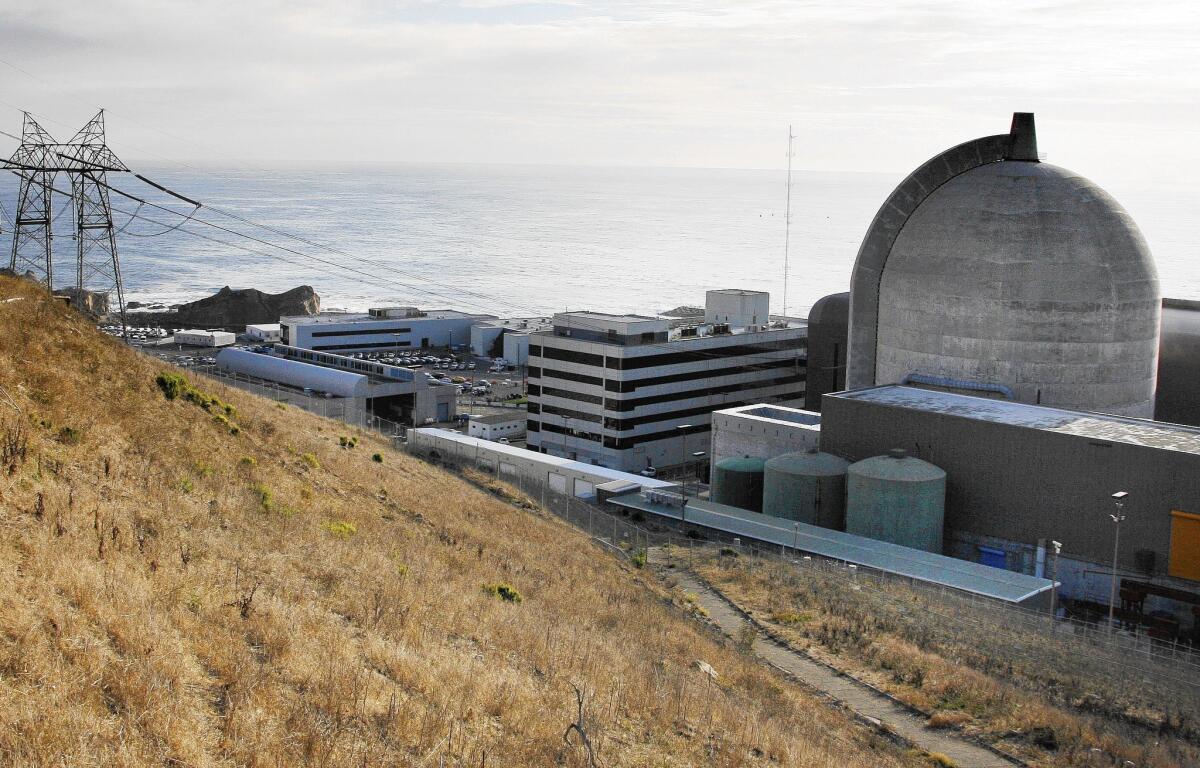
Gov. Jerry Brown isn’t quite ready to embrace nuclear power projects that are being explored by some Californians.
Asked about the potential for nuclear reactors to provide energy without greenhouse gas emissions, he said, “it’s also a potential terrorist site too.
An attack, he said, “would spread the radiation all around.”
During his first term as governor, Brown signed a law that effectively banned the construction of new nuclear plants in California. However, he acknowledged that work was being done on new technology that could create smaller, safer reactors.
“There’s a lot of movement in the nuclear field to make the reactors smaller, cleaner without the waste, and more resilient against the production of fuel that could be turned into a dirty bomb or an actual nuclear bomb," he said.
Brown added, “There’s lot of things in that area. So I wouldn’t rule that out at all.”
Times reporter Evan Halper wrote about possible nuclear innovations in California earlier this week.
Actor Leonardo DeCaprio in Paris
Christiana Figueres, executive secretary of the U.N. Framework Convention on Climate Change, tweets about her celebrity encounter.
Brown on stage
Behind the scenes as negotiators work on climate plan
In case you missed it Friday, reporter Chris Megerian detailed what it looked like from the climate talks as negotiators raced toward a deadline.
Get up to speed in 60 seconds.
Cheering for themselves
Behind closed doors
Climate change draft text leaves major issues unresolved
Negotiators from nearly 200 countries on Saturday adopted a draft text that left many issues unresolved before high-level talks next week aimed at reaching a global agreement to fight climate change.
The document, approved minutes before a noon deadline, is 48 pages long and full of competing options that will have to be disentangled when foreign and environmental ministers start meeting Monday at Le Bourget, on the northern edge of Paris.
"Major political issues must still be resolved," French envoy Laurence Tubiana said at Saturday's meeting. “It will take all our energy, intelligence, ability to compromise, ability to take a long-term view, to reach a result.”
After years of talks, many negotiators had hoped to accomplish more in the first week of the United Nations conference that opened Monday and is scheduled to wrap up on Friday. But they said there was still time to reach an ambitious deal to slow rising global temperatures by reducing greenhouse gas emissions.
“It’s certainly not the agreement we’re looking for in any number of ways,” Todd Stern, the lead U.S. negotiator, told reporters as diplomats were finalizing the draft Friday. But, he said, “I have high hopes it’s an agreement we will like in the end.”
The conference’s French organizers say they are determined not to repeat the failures of ill-fated climate talks that took place in 2009 in the Danish capital, Copenhagen.
It's movie night in Paris

Grab your popcorn — it's movie night in the City of Lights.
Gov. Jerry Brown is participating in a panel discussion after a screening of a "Time to Choose" by Oscar-winning director Charles Ferguson. The governor is featured in part of the documentary, and the Hollywood Reporter says he "gets high marks" for his policies on climate change.
Joining Brown on the panel will be Ferguson and Jane Goodall, the famous primatologist and conservationist.
Brown was featured in a much different light in another movie called "Dear Governor Brown" that was produced by environmental activists. It also was screened in Paris on Saturday and is aimed at getting Brown to take a harder line against fracking in California.
"By backing fracking, Gov. Brown threatens to undermine everything California is doing in the fight against global warming," said a statement from Kassie Siegel of the Center for Biological Diversity.
Jerry Brown on terrorism: "We have to be on guard."
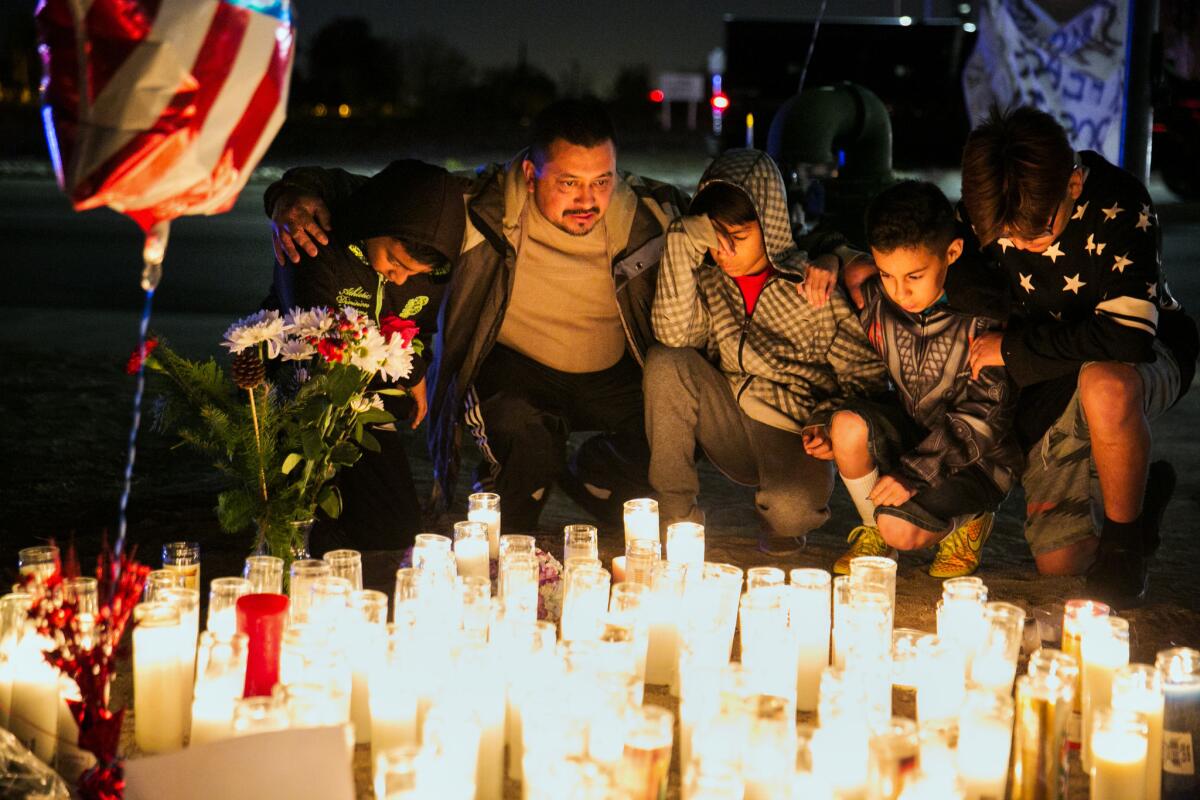
People kneel in prayer for victims of the recent mass shootings at the Inland Regional Center, in San Bernardino.
Gov. Jerry Brown is in Paris to talk about climate change, but during an interview he also answered some questions about terrorism in the wake of the attack in San Bernardino earlier this week.
The attack led the governor to delay his trip by a day, but he felt comfortable moving forward with his plans once it became clear there were no other shooters at large.
Brown called the attack "a very clear indication that this is a global phenomenon, and that people who are committed to this jihadist doctrine are going to be killing people in very unexpected places. So as I've said, we have to be on guard."
Read more about his comments here.
Jerry Brown, fresh off a transatlantic flight, speaks to climate summit
Gov. Jerry Brown called California’s drought “a very specific wake-up call” to the dangers of climate change in his first public remarks after arriving at the United Nations summit.
“Droughts have been going on in California for thousands of year,” he said. “But this one has been exasperated by the warming climate.”
The governor was part of a panel discussion with local leaders from around the world, one in a series of events intended to drum up support for a global deal at the conference.
Brown said there were steep challenges to tackling the problem, and touted the ability of states to make changes when national governments are too slow to act.
“We have a long way to go to deal with climate change,” he said. “A lot of inertia, a lot of complacency. We need the energy from the grassroots, from the states.”
A long way to go
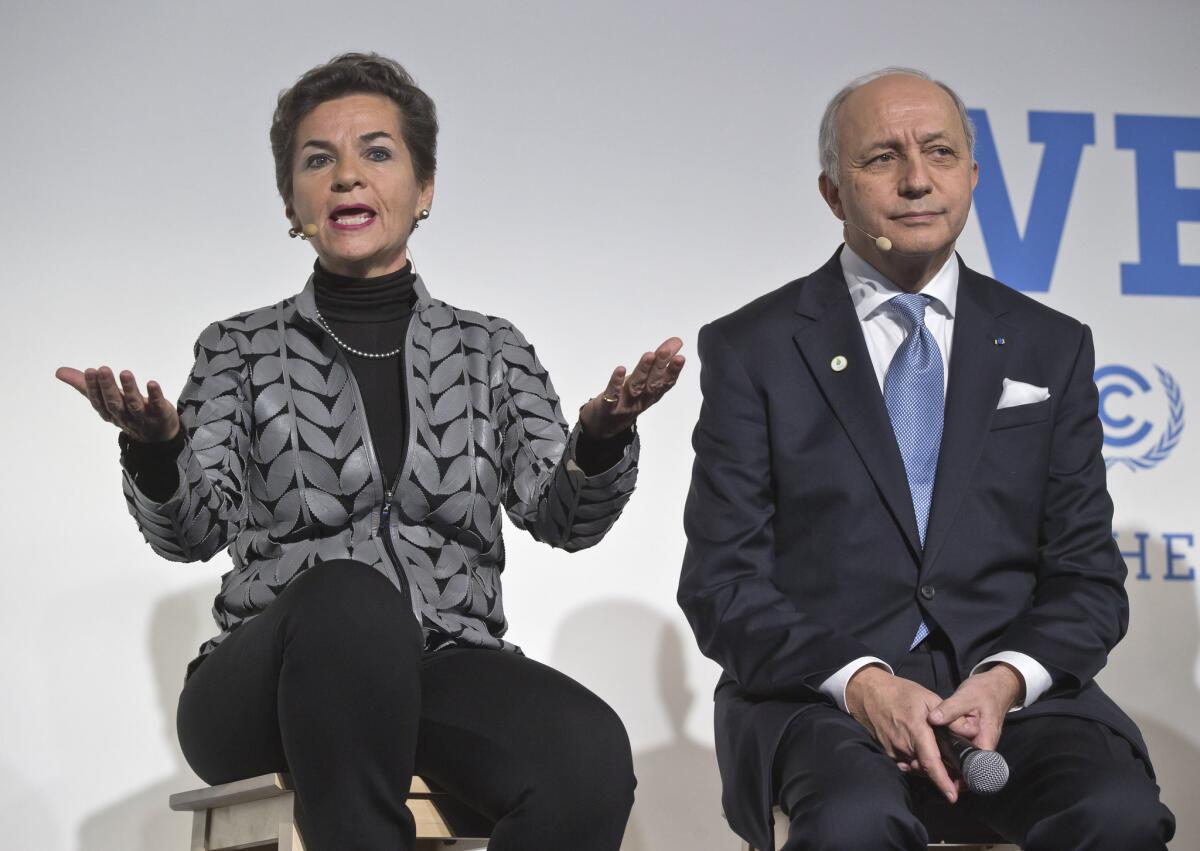
U.N. climate chief Christiana Figueres speaks on Action Day as French Foreign Minister Laurent Fabius listens at the climate conference outside Paris.
Negotiators from nearly 200 countries have adopted a draft text that will form the basis of high-level talks next week aimed at reaching an agreement to fight climate change by Friday.
The text, agreed to minutes before a noon deadline, is 48 pages long and includes numerous options for government ministers to decide when they start meeting Monday.
“The work is not finished. Major political issues are not yet decided," French envoy Laurence Tubiana told Saturday’s meeting. “It will take all our energy, intelligence, ability to compromise, ability to take a long-term view to reach a result.”
After years of talks, many negotiators had hoped to accomplish more in the first week of the conference that opened outside Paris on Monday. But they said there was still time to reach an ambitious deal to fight climate change by reducing greenhouse gas emissions.
Jerry Brown arrives, chats with Al Gore
You know you're in France when . . .
Golden State flexes on global stage
California isn't a country, but as the state's leaders never hesitate to point out, it qualifies as the world's eighth largest economy. So while the United Nations seeks a new international accord on climate change, the Golden State is trying to get some of the spotlight.
“We want to export what we’ve been able to accomplish so far,” Senate leader Kevin de León (D-Los Angeles) said before the trip. “What we want to bring back to California is more investment capital.”
Here is our story from earlier this week on California's heavy footprint at the conference.
Gov. Jerry Brown's first speech is scheduled for Saturday afternoon, but some state lawmakers have been here for a few days, speaking on panels and meeting with foreign leaders.
Today's schedule in Paris
Gov. Jerry Brown is scheduled to arrive this morning, and he'll be heading to convention center at Le Bourget where negotiators are working on a new climate accord.
He's expected to give a speech and have some private meetings. In the evening he's going to be on a panel with documentary director Charles Ferguson and conservationist Jane Goodall.
Get the L.A. Times Politics newsletter
Deeply reported insights into legislation, politics and policy from Sacramento, Washington and beyond. In your inbox twice per week.
You may occasionally receive promotional content from the Los Angeles Times.






